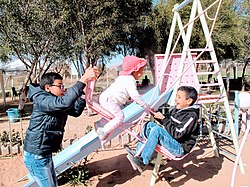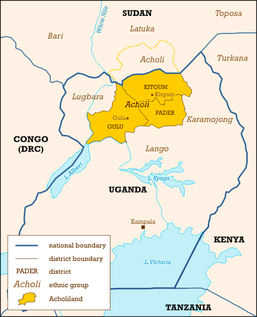AY Honors/African Lore/Answer Key
| {{{name}}} |
|---|
Acholi (also Acoli) is an ethnic group from the districts of Gulu, Kitgum and Pader in northern Uganda (an area commonly referred to as Acholiland), and Magwe County in southern Sudan. The 1991 Uganda census counted 746,796 Acholi; a further 45,000 Acholi live outside of Uganda.&
Language
The Acholi language is a Western Nilotic language, classified as Luo, and is mutually intelligible with Lango and other Luo languages.
The Song of Lawino, one of the most successful African literary works, was written by Okot p'Bitek in Acholi, and later translated to English.
History
Template:See also The Acholi are a Luo people, who are said to have come to northern Uganda from the area now known as Bahr el Ghazal in southern Sudan. Starting in the late seventeenth century, a new sociopolitical order developed among the Luo of northern Uganda, mainly characterized by the formation of chiefdoms headed by Rwodi (sg. Rwot, 'ruler'). By the mid-nineteenth century, about 60 small chiefdoms existed in eastern Acholiland.& During the second half of the nineteenth century Arabic-speaking traders from the north started to call them Shooli, a term which transformed into 'Acholi'.&
Their traditional dwelling-places were circular huts with a high peak, furnished with a mud sleeping-platform, jars of grain and a sunk fireplace, with the walls daubed with mud and decorated with geometrical or conventional designs in red, white or grey. They were skilled hunters, using nets and spears, and kept goats, sheep and cattle. In war they used spears and long, narrow shields of giraffe or ox hide.
During Uganda's colonial period, the British encouraged political and economic development in the south of the country, in particular among the Baganda. In contrast, the Acholi and other northern ethnic groups supplied much of the national manual labor and came to comprise a majority of the military, creating what some have called a "military ethnocracy." This reached its height with the coup d'état of Acholi General Tito Okello, and came to a crashing end with the defeat of Okello and the Acholi-dominated army by the National Resistance Army led by now-President Yoweri Museveni.
The Acholi are known to the outside world mainly because of the insurgency of the Lord's Resistance Army (LRA) led by Joseph Kony, an Acholi from Gulu. LRA's activities have been concentrated within Acholiland, and populous Acholi remain internally displaced persons.
Religion
Most Acholi are Protestant, Catholic and, in lesser numbers, Muslim. Nevertheless, the traditional belief in guardian and ancestor spirits remains strong, though it is now often described in Christian or Islamic terms.
Notable Acholi people
- Alice Auma, spirit medium and rebel leader
- Betty Bigombe, former MP and conflict mediator
- Joseph Kony, leader of the rebel Lord's Resistance Army
- Matthew Lukwiya, physician at the forefront of the 2000 Ebola outbreak
- Janani Luwum, former Archbishop of the Church of Uganda
- Norbert Mao, Gulu District Local Council V Chairman
- Tito Okello, President of Uganda for six months in 1985
- Bazilio Olara-Okello, de facto Head of State for six months in 1985 and later Chief of Defence Forces
- Geoffrey Oryema, exiled singer
- Olara Otunnu, former United Nations Under-Secretary-General and Special Representative for Children and Armed Conflict
- Okot p'Bitek, poet and author of the Song of Lawino
- Akena p'Ojok, Former UNLF Vice President, Former UPC Member of Parliament and Minister of Power In Obote II Regime
References
- Atkinson, Ronald Raymond (1994) The roots of ethnicity: the origins of the Acholi of Uganda before 1800. Kampala: Fountain Publishers. ISBN 9970-02-156-7.
- Dwyer, John Orr (1972) 'The Acholi of Uganda: adjustment to imperialism'. (unpublished thesis) Ann Arbor, Michigan: University Microfilms International .
- Girling, F.K. (1960) The Acholi of Uganda (Colonial Office / Colonial research studies vol. 30). London: Her majesty's stationery office.
- Webster, J. (1970) 'State formation and fragmentation in Agago, Eastern Acholi', Provisional council for the social sciences in East Africa; 1st annual conference, vol 3., p. 168-197.
Notes
- ↑ Acholi: A language of Uganda, Ethnologue
- ↑ Webster 1970.
- ↑ According to Atkinson (1994).
External links
- Acholinet.comAcholi People website with News, Forums, market Place, Downloads etc
- Rupiny, a newspaper in Acholi and Lango (Luo)
- Acholi sample at Language-Museum.com
- Uganda Conflict Action Network working for peace in northern Uganda
- Invisible Acholi Children Global Night Commute
de:Acholi (Volk) es:Acholi it:Acholi nds:Acholi pt:Acholis ru:Ачоли sh:Ačoli sv:Acholi


